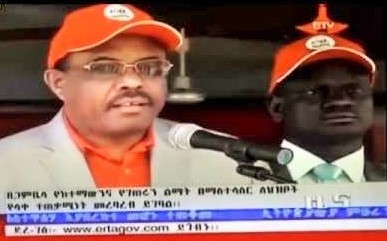Ethiopia urged to free jailed activists, World Bank worker
September 23, 2015 (NAIROBI) – A group of international development organisations and human rights groups on Tuesday urged authoriities in Ethiopia to immediately drop all charges pressed against two local activists and a former World Bank employee.

Authorities reportedly arrested the trio at Addis Ababa airport on 15 March, along with four others while they were on their way to Nairobi to attend a workshop on food security which was organised by an indigenous rights body and two international organisations.
Three were released without charge on 23 April and another on 26 June. However, three of those arrested are reportedly still being held in custody.
The charge sheet refers to the food security workshop, which was organised by an indigenous rights group and the two international entities as a “terrorist group meeting.”
On 7 September, authorities charged Pastor Omot Agwa, Ashinie Astin, and Jamal Oumar Hojele under the counterterrorism law after detaining them for over five months.
Omot worked as an interpreter and facilitator for the World Bank Inspection Panel’s 2014 investigation, which was established following a complaint by the Anuak indigenous people alleging widespread forced displacement and other serious human rights violations in relation to a World Bank project in Ethiopia’s Gambella region.
According to right groups, Omet of the evangelical Mekane Yesus church in Gambella region had raised concerns with workshop organizers about increasing threats from Ethiopian security officials in the weeks before his arrest.
People in Gambella previously alleged that the program was harming them by contributing to the government’s “villagization” program.
Residents alleged the “villagization” program was forcibly evicting thousands of indigenous and other marginalized peoples from their traditional lands.
After studing their case Omet is said to have reported their complaint to the World Bank board of directors, leading to the launch of the World Bank Inspection Panel.
However, Omot’s report leaked to the media in December 2014 putting him on the spot.
“Ethiopia should be encouraging debate about its development and food security challenges, not charging people with terrorism for attending a workshop organized by respected international organisations,” said Miges Baumann, deputy director at Bread for All.
“These absurd charges should be dropped immediately”, added Baumann
The charge sheet accuses Omot of being the co-founder and leader of a rebel group, Gambella People’s Liberation Movement (GPLM) and communicating with its exiled leaders abroad.
Ashinie is accused of participating in the GPLM, and having links with leaders of the group. If they are found guilty, the two could face upto 20 years in prison. Oumar was accused of being part of a “terrorist group” and organising recruits to attend the Nairobi workshop.
In 2011, the Ethiopian parliament designated five entities as terrorist groups. The GPLM was not on the list.
Since 2011, Ethiopia had been under fire from several international human right groups accusing the country of using the counter terrorism law as a tool to prosecute critical journalists, bloggers, opposition politicians and other anti-government protesters.
The food security workshop in Nairobi was organised by Bread for All, with the support of the Anywaa Survival Organisation (ASO) and GRAIN.
Bread for All is the Development Service of the Protestant Churches in Switzerland.
ASO is a London-based registered charity that seeks to support the rights of indigenous peoples in southwest Ethiopia.
GRAIN is a small international non-profit organisation based in Barcelona, Spain that received the 2011 Right Livelihood Award at the Swedish Parliament for its “worldwide work to protect the livelihoods and rights of farming communities.”
(ST)
